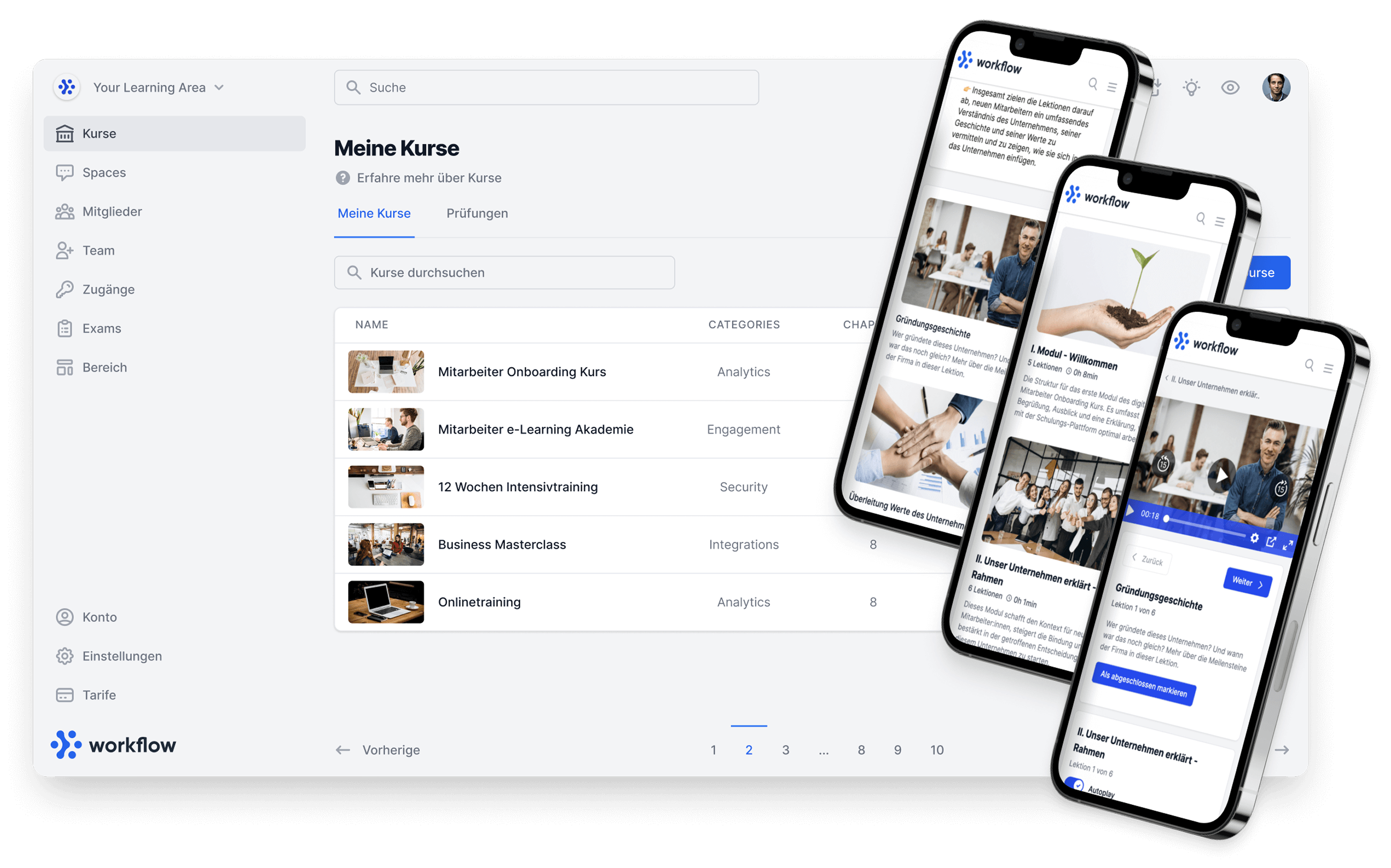Time and again, we receive questions from you about the legally compliant creation of online courses, employee training and e-learning.
This is precisely why we have collected the questions we receive most frequently and brought an expert on board. 🚣
Dominik has answered the most frequently asked questions from our community, but this article and interview do not replace legal advice and are for information purposes only. Because every case is individual, each situation must always be examined personally by a specialist.
Dr. Dominik Herzog is the founder of SYLVENSTEIN Rechtsanwälte, one of the fastest growing commercial law firms in the digital sector. They specialize in commercial law for companies with digital business models, focusing on general terms and conditions and digital contracts, but they also offer their regular clients an all-round carefree package for all legal challenges of daily business. SYLVENSTEIN Attorneys at Law also offer the individual and fast creation of general terms and conditions at a flat rate.
Dominik also worked for several years as a TV legal expert at ProSieben Sat.1 Media SE and was considered the legal expert on Galileo. 📺
He is also a lecturer at the LMU, cabaret artist, keynote speaker and YouTuber.
As Dominik himself uses Memberspot for his employee training courses and is familiar with our software and the creation of training courses and content, we filmed an interview with him in which he answers the most frequently asked questions about e-learning creation. 🎬
Watch the interview with Dr. Dominik Herzog here:
👉🏽 https://youtu.be/wXgBGwxwn8c
3.jpg%20(1).jpg)
Provide links to the legal notice and terms and conditions in the footer of the member area?
Have you asked yourself whether links to your legal notice or terms and conditions are mandatory in the footer of your member area? 📚
First of all, you should consider what functions the legal notice and terms and conditions fulfill, because they all have different functions.
Imprint
The legal notice serves to identify the provider and must always be available, both on the website and in the member area, because the legal notice provides information about who is the provider of this telemedia service.
Even with a YouTube channel on which a company uploads videos, both YouTube itself and the account must have an imprint.
So it's best to play it safe and always include your legal notice! 🔍
.png)
General Terms and Conditions
The GTC serve as the basis of the contract and contain provisions on topics such as what the user is allowed to upload and where, or how they must handle their account.
They are a contract between user and provider. 🖊️
The customer must be able to find out about the GTC at the first point of contact and when the contract is concluded. This is because the customer must have the opportunity to obtain information about the contractual terms and conditions of the person with whom they are entering into a contract.
It may therefore be too late to add the GTC in the member area, depending on how the customer has gained access to the course. If it is a customer with whom a contract has already been concluded and who only gains access to the course after the contract has been concluded, it is already too late to grant them access to the GTC. The GTC must already have been made available at this point.
.png)
Use third-party tools
What actually happens if you use a third-party tool to work with Memberspot? 👥
So if you use Zapier, an interface tool, to connect different tools to Memberspot, or connect tools such as Active Campaign and similar American tools directly, what do you have to do?
As soon as third parties are given permission to access user data, this must be documented and contractually regulated in the data processing agreement (DPA).
Among other things, this must include the following: Duration of access, permission to use data, may data be changed, etc.
Here too, if it is an initial consultation, for example, and a third tool is already being used in this context or only after the contract has been concluded, the provider must make it clear and transparent at all times what happens to the customer's data when they access the website or the member area.
In fact, you also have to conclude an order processing agreement with Zapier and the subsequent tools that you have linked. This involves a great deal of administrative effort. Since the European General Data Protection Regulation came into force, the DPA has generally been available for download from Zapier and other providers, such as social media platforms.
Here you simply have to google and look on the providers' websites, usually you will find them under the terms AVV, DPA or Data Privacy. Even these companies cannot sign all contracts with their customers themselves, which is why they make them available.
Dr. Herzog says: Yes, in most cases you need AVV contracts. You download them, sign them and file them, so you have documentation. 📂
.png)
Memberspot will also send you an AVV contract by e-mail, which you must confirm as soon as you register for the test period.
If you then create your member area, the AVV contract will be made available again. There you can enter your first name, surname and your company, so you have concluded the AVV contract with Memberspot.
This regulates which third-party providers Memberspot uses in order to be able to provide the services for customers. In the case of the order processing agreement, the providers have a duty to provide and must contact the third-party providers in order to obtain the DPA from them.
.png)
Will "lifetime access" to courses for customers remain in place even after termination of the contract with Memberspot?
First of all, you have to ask yourself the question: Lifetime of whom? ♾️
This is about the provider's lifetime and not that of the customer. This is why Dominik recommends not offering access rights such as a perpetual license to use content.
What happens if you cancel your membership with Memberspot at some point, will the courses still be listed if the course creator grants its customers lifetime access?
No, the member area will still be available for a few months, but will end if you cancel. This is because storage consumes bandwidth on our servers, which is why the content can no longer be consumed on the Memberspot platform after the hosting service with Memberspot has ended.
Recommendation by Dr. Herzog : No lifetime access granted. 🙅🏽
Due to the rapid pace of technological change, it is impossible to predict what will happen in two or ten years' time. Therefore, you may become legally vulnerable from the moment you as a provider can no longer provide the service. In the case of lifetime access, customers could then invoke the warranty for defects.
Alternatives:
- Alternative: Offer Lifetime Access, where the customer is responsible for securing the content. 🔒
It is possible to offer lifetime access, whereby the customer can download the content themselves. It should be clearly stated in the contract that the buyer is responsible for backing up the course content and that they must download the content themselves within the specified period.
- Alternative: Offer a limited period of time. ⏰
It makes sense to offer access over a period of time for which you can be sure that you can provide the service (e.g. 12-24 months).
.png)
Secure the image rights of your employees, even if they leave the company?
Dr. Herzog says:
The right to the image can be obtained with a declaration of consent to waive the image right. This allows you to collect the rights to the image material before any shoots or filming. This avoids having to produce the content again if the employee leaves the company.
If consent has not been obtained, all posts on the website and social media on which the employee in question is depicted must be deleted. This employee must even be removed from the team photos if the employee withdraws their consent.
This involves an enormous amount of work, especially for video courses, as they then have to be deleted and re-shot. 📸
.png)
Would you like to find out more? 🤓
Watch the full interview with Dr. Dominik Herzog now:👇🏽
Dominik has answered the most frequently asked questions from our community, but this article and interview are no substitute for legal advice and are for information purposes only. Because every case is different, each situation must always be examined individually.
If you have specific questions on these topics, you can also book an initial consultation with Dominik online on the website. 👈🏽
We hope that this article has answered some of the questions you may have asked yourself. 🤔
Kind regards
Your Memberspot Team


.png)








